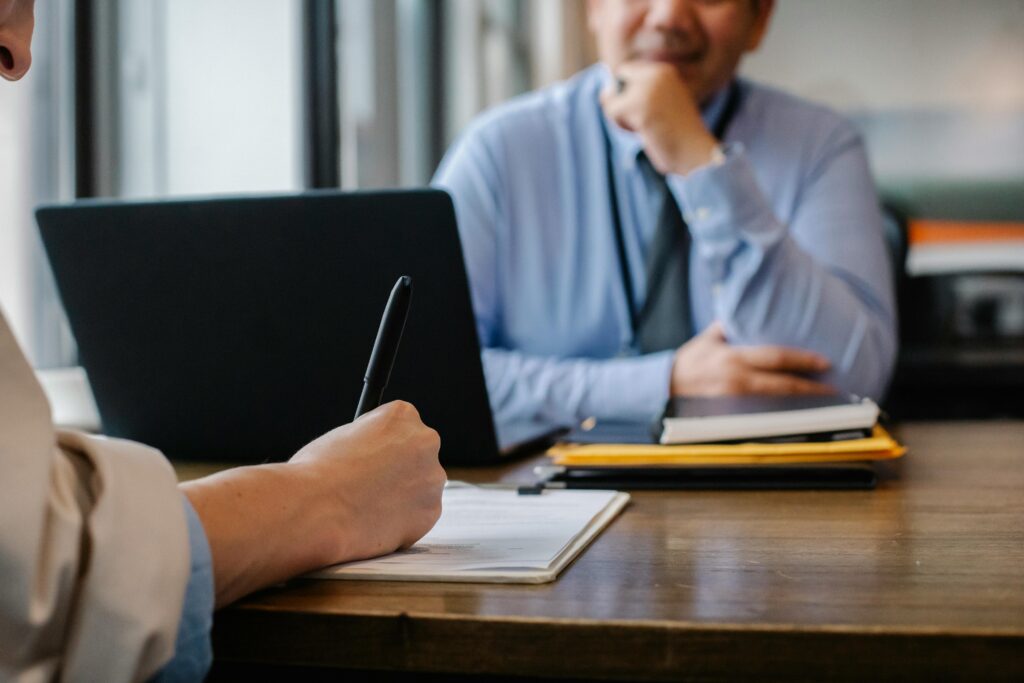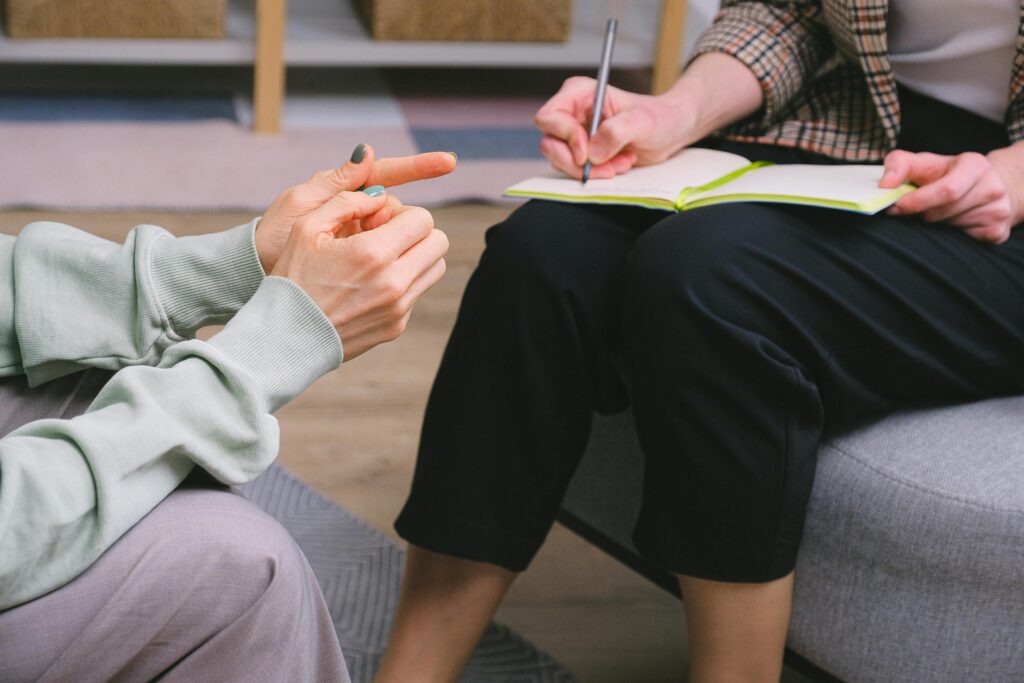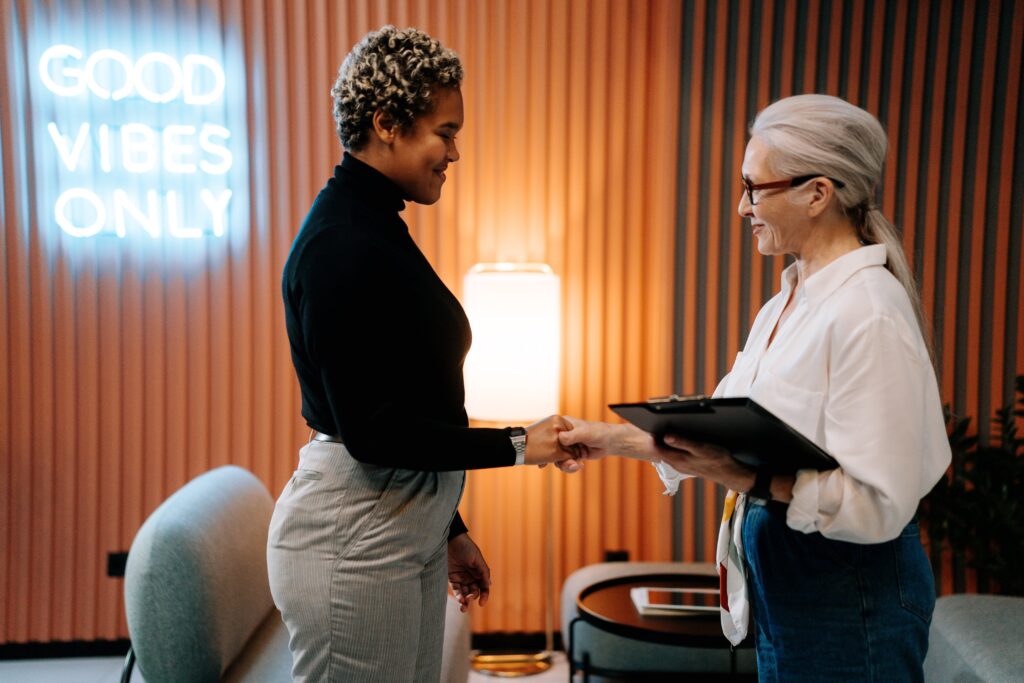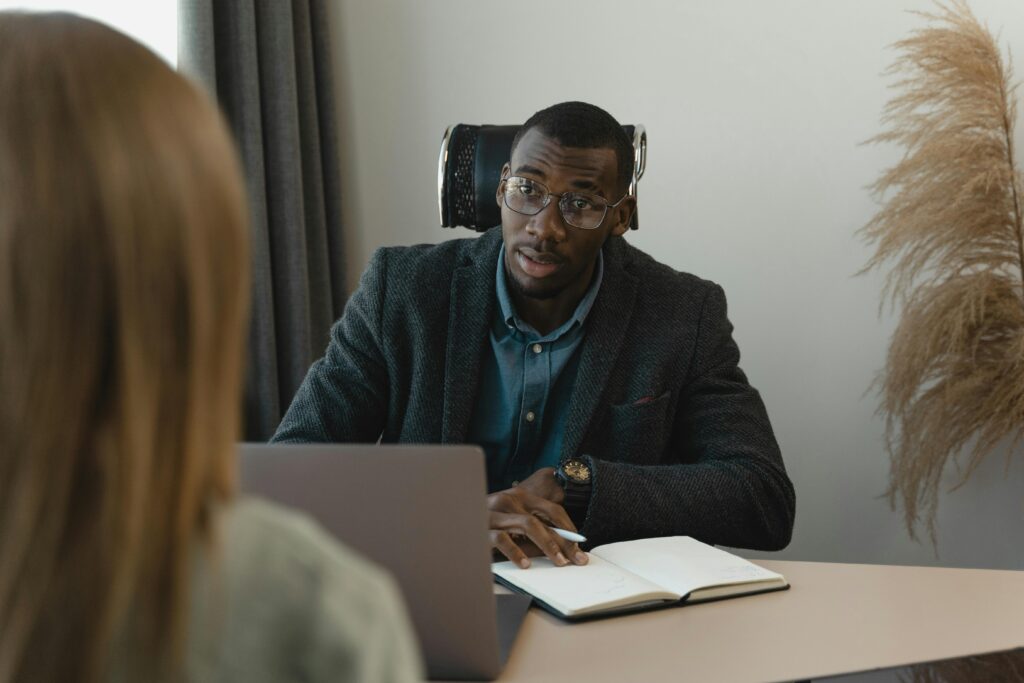Table of Contents
What to Bring to a Job Interview: The Introduction
Determining what to bring to a job interview can sometimes feel as daunting as the interview itself. The key to success, however, lies in preparation and presentation. The most crucial items are your resume, a notepad and pen, and a list of references, but don’t overlook the importance of a positive attitude and confidence. This advice sets the stage for a successful interaction, showcasing not just your qualifications on paper, but your proactive approach and readiness for the position at hand.
This blog aims to demystify the preparation process for job seekers, ensuring you walk into your interview equipped with everything you need – and nothing you don’t. From the tangible to the intangible, we’ll cover the essentials that will make you stand out as a candidate. Whether you’re a first-time job seeker or a seasoned professional, understanding what to bring will help set you apart in the competitive job market.

What to Bring to a Job Interview: The Essentials
When pondering over what to bring to a job interview, the first category that should come to mind is essential documents. These are not just pieces of paper; they are your first opportunity to showcase your professionalism and attention to detail.
Resume and Cover Letter
Despite the digital age, hard copies of your resume and cover letter are crucial. They offer a quick reference for the interviewer and ensure you’re prepared in case technology fails. Bring several copies in a neat folder; you never know if you’ll be meeting with multiple interviewers. Tailor each resume to the job you’re applying for, highlighting the skills and experiences most relevant to the position. Your cover letter should complement your resume, providing a narrative about why you’re the best fit for the role.
Portfolio/Work Samples
For many professions, a portfolio or samples of your work can speak louder than your resume. Whether it’s design, writing, coding, or any other tangible demonstration of your skills, make sure it’s organized and easily accessible. Select samples that are most relevant to the job and that showcase your range and depth. If your portfolio is digital, ensure you have an offline version or printed samples, in case you cannot access the internet during your interview.
List of References
A prepared list of references shows that you’re serious and considerate of the interviewer’s time. Choose references who can vouch for your qualifications and work ethic. Make sure to inform your references ahead of time that they might be contacted. Your list should include the name, position, company, phone number, and email address for each reference, as well as your relationship to them.
Tools for Note-Taking
A notepad and pen might seem like relics of the past in our digital world, but their importance during a job interview cannot be overstated. Bringing these tools to an interview does more than just prepare you to jot down notes; it signals to your interviewer that you are engaged, organized, and ready to capture important details.
Having a notepad and pen at hand allows you to quickly write down questions that come to mind during the interview, note the interviewer’s name and title if you didn’t catch it initially, and record key points about the job role or company culture. This not only helps in making an informed decision should you receive a job offer but also assists in sending personalized thank-you emails or messages post-interview.
Moreover, the act of physically writing can help reinforce your memory of the interview’s discussions, giving you an edge in your follow-up communications. Choose a professional-looking notepad and a reliable pen to demonstrate your seriousness about the opportunity.
Bringing these simple tools can set a positive tone for your interview, showing that you’re proactive and attentive—a subtle but effective way to stand out from other candidates.

What to Bring to a Job Interview: IDs & Forms
In the process of preparing for a job interview, it’s essential to consider the practicalities, such as which identification and forms you may need to bring along. While not always requested upfront, having these documents can streamline the interview process and demonstrate your organizational skills.
Identification
Always bring a government-issued photo ID, such as a driver’s license or passport. This is particularly important if your interview is in a secured building where you might need to register at the reception. Additionally, some companies may require proof of identification for their internal HR processes, even at this early stage.
Necessary Forms
Depending on the nature of the job and the company’s policies, you might also need to bring other forms or documents. This could include copies of certifications, educational transcripts, or even a background check if you’ve been informed to procure one in advance. For roles that require proof of eligibility to work, such as a work visa or employment authorization document, having these at your interview can show your preparedness and reduce back-and-forth communication later.
It’s a good practice to ask the HR representative or your contact within the company if there are any specific documents they’d like you to bring. This not only ensures you’re adequately prepared but also demonstrates your attention to detail and eagerness for the position.
By having your identification and any necessary forms organized and ready, you signal to your potential employer that you are thorough and conscientious—qualities that are valuable in any employee.
Questions for the Interviewer
One of the most telling signs of a candidate’s interest and engagement in a job opportunity is their preparedness to ask insightful questions. This not only shows you’ve done your homework but also that you’re genuinely considering how you can contribute to and grow with the company.
Why Ask Questions?
Asking questions is a crucial part of the interview for several reasons. It allows you to:
- Demonstrate your knowledge about the company and the industry.
- Show your enthusiasm for the role and the organization.
- Clarify any aspects of the job role or company culture that are important to you.
- Engage in a two-way conversation, which helps both you and the interviewer assess fit.
Types of Questions to Consider
Prepare a mix of questions that cover various aspects of the job and company:
- Role-Specific: Inquire about the day-to-day responsibilities and the skills deemed most valuable for the role.
- Team Dynamics: Ask about the team you’ll be working with, including size, structure, and common challenges.
- Company Culture: Questions about company values, employee development opportunities, and work-life balance can reveal a lot about your potential employer.
- Future Prospects: Inquire about how the company envisions growth and how the role you’re applying for fits into that picture.
- Feedback and Evaluation: Understanding how success is measured and what the performance review process looks like can give you insights into the company’s priorities.
Remember, the quality of your questions can leave a lasting impression on your interviewer, marking you as a thoughtful and proactive candidate. It’s a chance to not just learn more about your potential job but to showcase your depth as a potential asset to the team.

What Not to Bring
While much focus is placed on what you should bring to an interview, being mindful of what to leave behind is crucial. Certain items can distract from the professional image you aim to project or even negatively impact the interviewer’s perception of you.
Personal Items
- Excessive Accessories and Perfume: While it’s important to express your style, overly flashy accessories or strong perfume can be distracting. Opt for a more subdued, professional appearance.
- Beverages or Gum: Walking in with a coffee cup or chewing gum can come across as unprofessional. It’s best to finish these before entering the building.
Electronic Devices
- Smartphones: Although it’s unrealistic to leave your phone behind, ensure it is silenced or turned off to avoid interruptions. Checking your phone during an interview can be perceived as disinterest or disrespect.
- Tablets and Laptops: Unless specifically requested for a presentation or to showcase your portfolio, large electronic devices can be cumbersome and unnecessary.
Negative Attitude or Complaints
- Personal Baggage: An interview is not the venue for airing grievances about previous employers or colleagues. Maintain a positive tone and focus on what you can bring to the new role.
Confidential Information
- Documents from Your Current Employer: Bringing work or proprietary information from your current or previous employer to an interview can raise ethical concerns about your discretion and respect for confidentiality.
Understanding what not to bring to an interview is as essential as knowing what to include. By avoiding these items, you reinforce your professionalism and respect for the interviewer’s time and the opportunity at hand.
Personal Presentation Items
Your attire and grooming are among the first things an interviewer notices, and they set the tone for their initial impression of you as a professional. What you choose to wear and how you present yourself can convey respect for the interviewer and the company, as well as your seriousness about the position.
Professional Attire
The appropriate dress code can vary widely depending on the company’s culture—from traditional corporate wear to more relaxed startup attire. Researching the company beforehand can give you insights into what’s expected. When in doubt, err on the side of being slightly overdressed rather than too casual. This shows you’ve put thought and effort into your appearance for the interview.
Grooming
Proper grooming is equally important. Neat hair, minimal and conservative makeup (if any), clean fingernails, and a subtle fragrance (or none) are key elements of a polished appearance. This attention to detail can communicate your professionalism and how you manage yourself in a professional setting.
Accessories and Details
Accessories should complement your outfit without overshadowing it. Choose a professional bag or briefcase to carry your documents and personal items, opting for one that is functional yet stylish. Your shoes should be clean and in good condition, reflecting your overall attention to detail.
Final Checks
Before leaving for your interview, take a moment for a final check in the mirror. Ensure your clothing is wrinkle-free, there are no stains, and your overall appearance is neat and tidy. This not only boosts your confidence but also ensures you make the best possible first impression.
Remember, your goal is to be remembered for your qualifications and conversation, not for a wardrobe malfunction or an overpowering cologne. By giving thought to your personal presentation, you communicate that you are ready and eager for the opportunity to become a part of their team.

What to Bring to a Job Interview: The Conclusion
Your preparation for a job interview and the items you choose to bring are a testament to your professionalism and your desire for the position. The subtle nuances in your preparation—from the documents you carry to the questions you prepare and even the attire you select—all contribute to the narrative you present to your potential employer. They are reflections of your dedication, attention to detail, and your understanding of the professional environment.
Remember, every element of your interview preparation, from what to bring to how you present yourself, serves a dual purpose. It not only provides you with the tools and confidence you need to succeed but also communicates to the interviewer your commitment and suitability for the role. As you leave the interview, you want to ensure that you have left a memorable impression, one that distinguishes you from other candidates not just through what you say, but also through the unspoken cues of your preparation and presentation.
Questions to Ask When Replying to an Interview Invitation
What to Bring to a Job Interview: FAQs
What if I cannot provide a portfolio or work samples for the interview?
If your profession doesn’t lend itself easily to tangible work samples, consider preparing a case study or a presentation of your achievements. You can also discuss specific challenges you’ve overcome or contributions you’ve made to past projects, providing detailed explanations and outcomes.
How many copies of my resume should I bring to the interview?
It’s wise to bring at least five copies of your resume. This ensures you have one for each interviewer, plus a few extras in case the interview panel is larger than expected or you encounter additional stakeholders in the company.
Is it appropriate to bring notes to a job interview?
Absolutely. Having notes on your questions for the interviewer or key points you wish to discuss about your qualifications shows preparation. However, keep them brief and use them sparingly to ensure they don’t disrupt the flow of conversation.
How early should I arrive for my job interview?
Aim to arrive about 10-15 minutes before your scheduled interview time. This shows punctuality without being so early that it creates an awkward situation for your hosts.
What should I do if I need to bring my phone into the interview?
Ensure your phone is set to silent mode or turned off completely. If you must have it on for emergencies, inform your interviewer at the beginning of the meeting and apologize in advance for any potential interruption.
